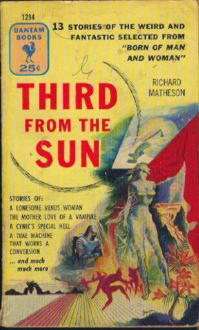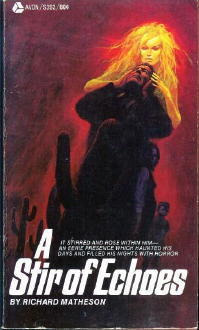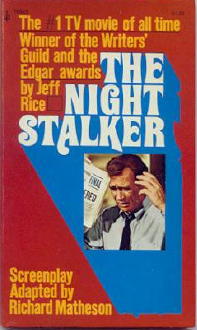|
ED GORMAN CALLING: We Talk to Richard
Matheson
Just about every time I’ve ever written about Richard Matheson over the past thirty years, I’ve started out the same way. The night of my eighth grade dance. My very first real dance. I’m duded to the max. Black suit and pink shirt and black tie. Like the one I’d seen Gene Vincent wear at the local dance club a couple of months earlier. On this cold February night I am on a mission. I am going to win at least one dance with the girl I’ve loved with embarrassing fidelity since fifth grade. She must be aware of my painful condition – God knows I’ve humiliated myself enough because of it – but she’s far too busy fending off high school boys. Her beauty is quite apparent to them, too. Well, friends and neighbors, this night, she does not go so well. The usual criminals I hang out with are nowhere around. They see this dance as strictly candy-ass. I am left, the only kid there with a true duck’s ass, to talk to boys in crew cuts and butch wax and gray suits. As I recall, they were friendly enough but wary of me because of the tough crowd I ran with. What the hell was I doing here? they wondered. A nd soon enough, I wondered, too. Long story short: she danced with five or six different boys, and then a sophomore heartbreaker (just ask him) sort of commandeered her. She danced with nobody else but him. My chance was past. I left for home early in the winter night. It was cold but at least the shadows were comforting. I felt a whole lot less foolish in the darkness. 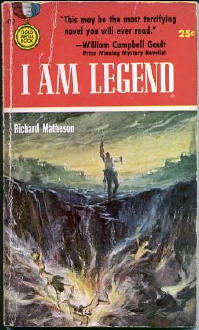 Three blocks from my house was a pharmacy that didn’t close until 10:00. I stopped in there to have a Pepsi and a smoke. As always, I looked over the metal swivel paperback rack. This was 1955. I’d probably heard the name Richard Matheson in a few of the science fiction magazines I’d just begun reading, but I’d never seen a book of his before. I took I Am Legend home, and two pages in forgot my broken heart entirely. I had never read a book that transported me so totally into its reality. Not only was it a harrowing suspense story, it had an emotional power and resonance that would remain with me the rest of my life. That night, Richard Matheson became one of my three favorite writers. He’s remained so for more than 50 years now. Back in 1955, I divided my reading between mysteries and science fiction. I generally felt closest to the mysteries, especially the Gold Medal novels by John D. MacDonald, Charles Williams, Peter Rabe, Lionel White, and several others for a simple reason: The world they tended to set their stories in was my world, a working-class neighborhood with more taverns than churches, a Greyhound bus station, serious games of craps and poker played in drafty basements, a fair number of teenage boys and girls alike shipped off to reform school or even prison, and cops who were always dragging your friends off to jail, especially if you happened to be black, as about a fourth of the neighborhood was in those days. The next two Matheson novels I read were Fury on Sunday and Someone is Bleeding. They were every bit as brutal and real as any of my favorite Gold Medal writers, and with an added attraction: In Matheson novels, romance, often painful romance, drove the story as much as the violence did. To this day I prefer my novels to have man-woman stories in them. Not Romance. But romance. A year later or so, Bantam did the first mass market edition of his collection Third from the Sun. Friends of mine who hated to read ate up every single page of it. If the subject had been The Works of Richard Matheson, these kids would have gone on to graduate school instead of flunking out of high school. 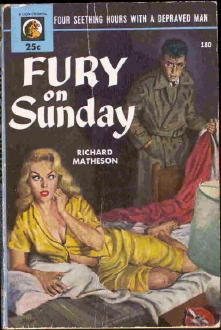 Matheson was one of the first writers I consciously copied. Those short, jabbing sentences. Those clearly defined settings. The dialog that could create a human being in just a few lines. And plots that just never let you go. I believe I read “Dying Room Only” three times the day I found it in a pulp in a second-hand store. Yes, he could write humor and adventure and even outré settings on far-off worlds. But mostly what he could do – whatever the setting or storyline or tone – was make it impossible to put down whatever story of his you were reading. The people were just too damned real, and their dilemma just too damned urgent. He was also capable of constantly surprising his readers by shifting the types of stories and novels that attract him. Though he was known as a horror writer, he was equally skilled with suspense, Westerns, and pieces that are unclassifiable. Which he continues to do today in a variety of story types and the hell with career consistency. His serious interest in the supernatural was first expressed in Hell House. His serious interest in spiritual matters was first expressed in What Dreams May Come. Now, you could argue that these novels evolved naturally from some of his previous work. Well, yes and no. Yes, he had written stories about hauntings and the supernatural before, but never with the singular and serious purpose of Hell House. And yes, his work had touched on matters of time travel and the quantum universe before, but never at the length or with the aching beauty of What Dreams May Come. Same with the Western novels. Except for a few early stories, Matheson had never seriously attempted to work with that most venerable of forms. But when he did so, with Journal of the Gun Years, he wrote what has to be one of the most unique and powerful Westerns of the past quarter-century. With a single novel, he was up there with the big guys, Elmer Kelton and Ernest Haycox and Elmore Leonard. There is no way to cover my favorite Matheson books in any depth in this piece, but I would like to pass along a few thoughts on a writer I’ve just never quit reading. Virtually all of his work has improved with age. The late mystery writer Erle Stanley Gardner – whose smart-ass novels as by A.A. Fair I think you’ll enjoy as much as I do – wrote some of his fiction in such a way that it was “timeless.” At least this was what he thought he was achieving by almost never making contemporary references in his later Perry Mason novels. No song titles, no movie titles, no fashion styles were cited. But Gardner was too tricky by half with this ploy. What he achieved was not “timelessness” but an odd sterility of setting. The later Mason’s happen in a world that has no reality. It’s like a shooting a movie with the actors standing in front of a blank wall. I recommended his A.A. Fair’s because they have a lot of atmosphere, especially those set during World War Two. 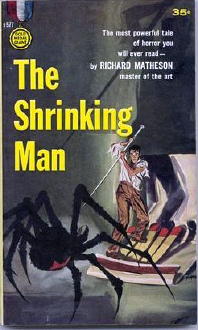 I mention this because while Matheson’s descriptions of time and place are usually spare, they still manage to evoke the decade in which they were written. The first couple of pages of A Stir of Echoes, as just one example, carefully and evocatively establish that our protagonists and his neighbors are working-class folks, something the under-appreciated film adaptation had the courage to match. So now to some – but not all– of my favorite Matheson novels. But not the classics such as I Am Legend and The Shrinking Man. I’d rather talk about a few of the novels and stories that don’t seem to get much mention. The Shrinking Man is invariably and deservedly praised for its action set-pieces, especially the extended scene with Scott Carey battling the Black Widow spider. But I’ll tell you, for me the most difficult scene to write may well have been when Carey, now 49 inches tall, attempts to make love to his wife. Because what you have here, friends and neighbors, is a dirty joke. Think about the kind of bar patter this situation would inspire in any other hands. Seinfeld’s George and his “shrinkage” problem (yes, ladies, they really do shrink when you’ve been in cold water) was nothing compared to what Carey experiences. But Matheson makes this one of the most tender, emotionally compelling scenes in the book. It could have been lurid and freakish, and yet it defines Carey’s love for his wife Lou in a way no other scene in the book quite matches. Earthbound is usually dismissed as minor Matheson, and I’ve never quite been able to figure out why. The bestseller, Stuart Woods did a book called Under the Lake which used many of the same tropes and tricks. He didn’t copy the Matheson book – he may not even have read it – but he did show us how not to write a novel about being possessed by gorgeous erotic supernatural women (though, to be fair, there are some nice long stretches of writing in it). Matheson takes what is essentially the material of a dirty joke – humping lady spooks – and turns it into a serious and moving look at a marriage that is beginning to fail, and a man who has begun to question some of his key values. The use of barren seashore winter images to contrast with the heat of the ghost is remarkable, as is the sorrow of the wife who can’t understand – or quite face – what her husband is going through. It’s one hell of a good, solid, eerie read. This is one of the few supernatural stories I’ve ever found believable, by the way. 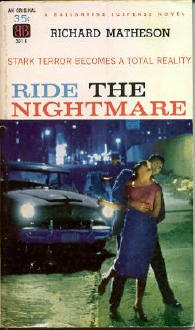 Ride the Nightmare.
This novel virtually vanished for two or three decades. There was
an Alfred Hitchcock Presents
version of it that a lot of people like, but which failed, for me, to
capture the singular grinding terror of the novel. Familiar
material turned into a masterpiece, if you want a slug line for this
novel. Respectable married man with a Past finds his life turned
into horror when a couple of thugs from his yesterdays turn up and try
to blackmail him into helping them out with a new job. There is a
particular ’50s feeling to this material that enriches the way Matheson
handles the marriage in this one. It dates well because it speaks
of and to its era. I’ll tell you true – whether you’re an
established pro or a beginner, if you want to take a graduate school
course in writing suspense novels, memorize this book. Ride the Nightmare.
This novel virtually vanished for two or three decades. There was
an Alfred Hitchcock Presents
version of it that a lot of people like, but which failed, for me, to
capture the singular grinding terror of the novel. Familiar
material turned into a masterpiece, if you want a slug line for this
novel. Respectable married man with a Past finds his life turned
into horror when a couple of thugs from his yesterdays turn up and try
to blackmail him into helping them out with a new job. There is a
particular ’50s feeling to this material that enriches the way Matheson
handles the marriage in this one. It dates well because it speaks
of and to its era. I’ll tell you true – whether you’re an
established pro or a beginner, if you want to take a graduate school
course in writing suspense novels, memorize this book.Shadows On The Sun. Here’s one for you, a horror-Western, the only good horror-Western I’ve ever read/seen/heard of, in fact. This was originally a screenplay but it adapted just fine, thank you, to prose. Would’ve made a really nice TV movie back when the networks were pushing that long lost breed of cat (I don’t count all those current Sunday and Monday night weepies as TV movies – they’re just long form soap opera installments). This would also make an especially fine graphic novel should anybody be interested. Here, atmosphere and plot trump character, though Matheson gives us some really nice glimpses into some really not nice people. His mixture of Indian supernatural lore with the spur-jingling realism of traditional Western tropes works very very well. The Beardless Warriors is another one of those Matheson novels that disappeared for decades after a successful first appearance. This is likely one of his three or four most accomplished novels for two reasons – it is, for me anyway, his most ambitious in terms of the writing problems he sets for himself. The first difficulty is to shape a fast-paced drama coherently about a group of young draftees. A group, mind you; do a group but make them each individual enough that you remember them as separate people. This is no simple drama. He must describe a war, Pvt. Everett Hackermeyer’s place in that war, and the young man’s reaction to the numerous small dramas all around him. I love this book, and I generally hate war novels. But Matheson plays the entire symphony here – action, tragedy, poignance, humor, the lore of epic battle, and a stunning portrait of a young man’s feelings about the requirements of war. No John Wayne crapola here. This is much more in the mode of Samuel Fuller’s THE STEEL HELMET, reporting the tedium and terror and ambivalence of young soldiers in battle. I can’t over-estimate the grace or power of this novel. (This is one of the many recent reissues in handsome trade paperbacks from Tor/Forge.) 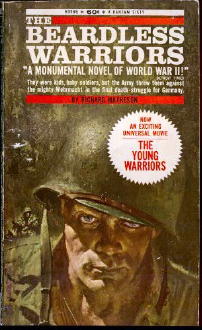 What Dreams May Come. My wife Carol read this shortly after she was diagnosed with Multiple Sclerosis. (Not to worry; she’s symptom-free now.) The book changed her life, as she always tells people when urging them to read it. She found in it elegance and beauty, the kind of spirituality she’d never been able to find in churches, a sense of spiritual well-being unfettered by dogma or doctrine. While my reaction was less dramatic, I was struck by how similar my own vague religious feelings are to Matheson’s. This is the ultimate love story, of a husband who seeks, and ultimately saves, his wife even though he has died and exists on another plane of reality. I’m not drawn to novels of spirituality, but this one works as both a spellbinding fantasy and a serious speculation about life after death. Bid Time Return. In gentler times, there was a fine fantasy writer by the name of Robert Nathan. His most famous book was Portrait of Jenny, which is one of the finest romances I’ve ever read. Then came Jack Finney who, after scaring the hell out of us with The Bodysnatchers, spent the second part of his considerable career re-imagining his beloved town of Galesburg, Illinois in two excellent historical novels. I’d say that Matheson, in Bid Time, demonstrates that he is their equal in matters of time travel mixed with romance. What an enormous accomplishment this novel is – a quicksilver story of a man and woman of different centuries who not only fall in love, but transcend the problems of time. It’s hard to imagine any kind of reader not liking this book. The word “fetching” was created to describe it. The Kolchak Scripts. Gauntlet Publications is in the midst of a major Matheson publishing and re-publishing program. That excellent journalist and reporter Mark Dawidziak has put all three Kolchak scripts (the third being a collaboration between Matheson and William F. Nolan) plus extensive (and excellent) essays on the entire Kolchak saga into a huge volume that is certainly the definitive book on the subject. If PSYCHO forever changed suspense movies and novels, the first Kolchak movie forever changed horror movies and novels. Yes, there had been gritty newsroom horror films before; and yes, there had been wry, even comic horror flicks before. But using Jeff Rice’s clever novel as a basis, Matheson brought his own shrewd take to this new form. Instead of using humor as farce or slapstick, he used humor to make the realistic elements all the more darker and more believable. I just watched it again, and it’s as fresh, sassy, and spooky as it was three decades ago. It’s a gloriously lurid and nasty piece of work, glitz played off just the right amount of gore, a true classic. Chris Carter has always said that The X-Files was directly inspired by The Night Stalker, and when you think about it, it sure was. What is odd is that X-Files was imitative in many ways, but there were few Night Stalker homages (as we call them in the land of litigation). Maybe this is because the Matheson-McGavin duo brought a unique insolence to the respective parts they played. In places, Night Stalker teetered right on the brink of parody, both in the writing and in McGavin’s acting. But it never crossed the line, remaining mostly dark and surprisingly realistic because Matheson gave the whole journalistic angle the world-weariness (if not cynicism) one finds in most real newsrooms. Gauntlet also published Matheson’s award-winning and beloved children’s book Abu and The Seven Marvels, a bracing adventure that your kids and grandkids love (mine sure do). You’ve got your princess, you’ve got your hero, you’ve got your wizard, and you’ve got your quest. You might think you know what Matheson does with these familiar elements, but you’d be wrong. Matheson never gives us same old, same old. Never. Camp Pleasant. Cemetery Dance Publications is another small press that has produced several beautifully made and important books by Matheson. Camp is a superior short novel about a summer camp that is turned into a concentration camp of sorts by the man who runs it. The writing here is outstanding Matheson, outright poetic in places, mixing humor and terror as the bully intimidates virtually everybody in the camp. This is a real page-turner with plenty of suspense, but most of all there is Matheson’s compassion for the weak who must suffer at the hands of the ruthless. A fine, quiet addition to the Matheson library.  So what is Richard
Matheson up to these
days? Hard at work. As always. He’s got many fine
books yet to write. He assured me of that during a recent
conversation. So what is Richard
Matheson up to these
days? Hard at work. As always. He’s got many fine
books yet to write. He assured me of that during a recent
conversation. Final draft 1-16-04. ED GORMAN: What do you consider the highlights of your career thus far? RICHARD MATHESON: I guess the highlights of my career would, of course, have to be the projects that worked out best. A few examples: Novels like I Am Legend, The Shrinking Man, The Beardless Warriors, Bid Time Return (soon to be called, understandably, Somewhere in Time), Hell House, What Dreams May Come, Hunted Past Reason, Abu and the Seven Marvels, a few others. As I have said a number of times in the past, I think Somewhere in Time is the best-written novel I’ve done. I was reading some pages from it in the past week, and (immodestly noted) I thought that the writing was really lovely. Yes, that’s the adjective I came up with – really charming prose, but enough of my immodesty. As I have also said in the past, I think What Dreams May Come is the most important (read effective) book I’ve written. It has caused a number of readers to lose their fear of death – the finest tribute any writer could receive. Highlights of my script work: four or five of the 14 Twilight Zone’s; SOMEWHERE IN TIME; THE MORNING AFTER, DUEL, and THE DREAMER OF OZ on television. Hoped-for highlights with only moderate gratification: my two metaphysical books The Path and A Primer of Reality. To these two I would add Hunted Past Reason because I wrote it to state my metaphysical basic assumption, the quote up front in the novel is “To die is nothing. To live is everything.” I wanted the novel to be called To Live but, to my consternation – and for the first time in my entire book-writing career – Tor put their own title on it; a quote from “King Lear,” which was pointless to print, because it has absolutely nothing to do with the story and the point I was trying to make. I suppose there were other highlights, but these will suffice. Low points? Scripts re-written by producers, one novel re-written because the two women editors decided that I couldn’t write good English! Actually, most of my novels – and movies and television scripts – were printed and/or produced word-for-word. Low points occurred in that, despite the religious adherence to my words, a number of the television shows and movies were poorly done. I won’t name them. 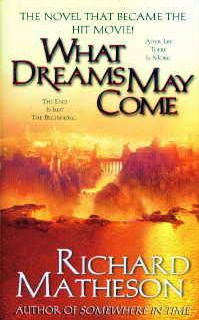 ED G.: What do you like and dislike about the current state of movies? Television? Publishing? R. M.: I think the current state of movies and television is pathetic. I just read a long article this morning in the Los Angeles Times citing the creative blunders of many of the major studios in which marketing considerations blinded them to the sad fact that almost none of the films had any interest to the public. Instead of making films that were creatively exciting, they functioned as marketing ploys – “Oh, that worked before, let’s do it again.” And again. And – ad boring. And if a film was creatively exciting, the “new” audiences didn’t really warm to them and they barely made their costs or actually lost money. As a member of the Academy and the Writers Guild, my vote went to Seabiscuit, a wonderful film, which had made a limited amount of money, not blockbuster caliber; with marketing costs on top of production costs, it might lose money. A pity. Which is why good films with limited box office receipts really need the Academy Award to bolster earnings. In brief: Films today? Pathetic! I can’t pass judgment, but I will say that I think publishers have the same “blockbuster” mentality as movie producers. King, Koontz, Crichton, Grisham, etc. – not to mention J.K. Rowling, who has created a publishing world all her own. When a writer has more money than Queen Elizabeth – Yow! ED G.: Looking back on your career, is there anything major you’d do differently? R. M.: Yes. I’d complete novels I didn’t finish. My self-assurance as a writer has been lamentable. Come Fygures, Come Shadowes was intended to include every aspect – good (and bad) – of spiritualism, plus an approach to modern parapsychology; shame on me for not finishing it as well as The Link, which was intended to include the entire history of mediumship, as well as a total study of modern parapsychology. Shame on me twice. 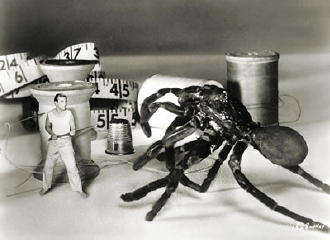 ED G.: Do you have any
particular favorites among your writing in
various media? ED G.: Do you have any
particular favorites among your writing in
various media?R. M.: As indicated, Somewhere In Time is my favorite novel. The Beardless Warriors is good, too. Movies and television: I think I’ve mentioned some. I might add THE COMEDY OF TERRORS (very funny, I think). Short stories: Too many to pick favorites. I like “The Test,” “Duel,” and “The Distributor.” This last one I probably wouldn’t write today. I hate it when something I’ve had published “inspires” some nut to imitate what I’ve written, or some teacher gets fired for having her students read one of my stories or novels. ED G.: Though you’ve always used supernatural themes in some of your work, there is a deepening spirituality in your fiction as the decades pass. Was this because of your growing personal feeling about the nature of the human soul and what lies beyond what we call life? R. M.: I have read countless books on parapsychology, metaphysics, etc., through the years. My special favorite is Thinking and Destiny by Harold W. Percival. It inspired my book The Path which consists mostly of quotes from Thinking and Destiny. Anyway, I have studied these books and evolved my personal philosophy which, when all the details are considered, consists of that little quote in Hunted Past Reason – “To die is nothing. To live is everything” – with all that implies. ED G.: Were you religious as a youth? R. M.: Not particularly. I was raised as a Christian Scientist, which I accepted. A good religion. On the wall of the pulpits in Christian Science churches is the phrase “God is Love;” not a bad statement. ED G.: Did your experience in World War Two affect your religious views? R. M.: I used my Christian Science belief system when I was in infantry combat. It reassured me. At the same time, my blood pressure went sky high – so you pays your metaphysical money and you takes your choice. Later, I left the Christian Science religion and chose to evolve my own belief system, which does not adhere to what has been described as “Churchianity.” However, I still think Christian Science is an acceptable religion. ED G.: What project are you working on currently? R. M.: A one-man play; I won’t give you the title. I also have a suspense-comedy due to be produced in London if and when we can come up with a leading man. I would like to concentrate of theater for the next decade – whether that works out or not rests in the laps of the theater gods. 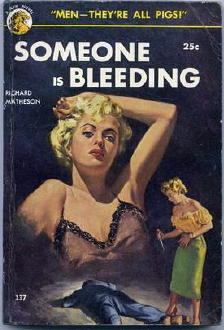 ED G.: Your work grows in stature with each decade, and seems assured of enduring. Do you have any thoughts on that kind of immortality? R. M.: I hope people are reading my work in the future. I hope I have done more than frightened a couple of generations. I hope I’ve inspired a few people one way or another. Actually, the highlight of my life – which, of course, had an enormous influence on my writing career – was meeting Ruth Woodson on the beach in Santa Monica in 1951, falling in love with her, marrying her, and creating with her a family of four children; two sons, two daughters. My love for them, and growth because of them, made my writing life what it was. It’s a process I advocate for any would-be writer. An earlier version of this article and interview appeared in Filmfax magazine, 2004. This slightly revised version © 2006 by Edward J. Gorman. YOUR COMMENTS ARE WELCOME.
|
